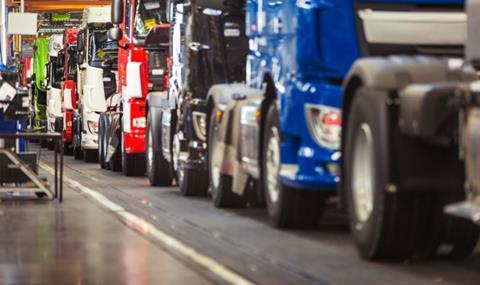
The large-scale transition to electric commercial vehicles and economic recovery can only be achieved if a “favourable” Brexit deal is thrashed out, according to the SMMT.
Its comments followed the release of dire production figures for October, which showed CV manufacturing fell by 25.6%, with just 6,761 units leaving factory gates.
The SMMT said overseas and domestic market production figures are in double-digit decline as a result of the Covid-19 pandemic and the ongoing threat of a no-deal Brexit hitting operator confidence.
Factories turned out 2,326 fewer trucks, vans, buses and coaches than in October 2019, in spite of the CV and logistics sectors working hard to keep the country moving.
Performance in the year to date has fallen by 18.1% overall, with a shortfall of 11,256 units in the first 10 months of the year.
Just over 50,000 CVs have been made in Britain so far in 2020.
Mike Hawes, SMMT chief executive, said the figures demonstrated the immense pressure the sector was under: “During the pandemic the industry has stepped up, flexing to meet demand while, as always, putting safety first,” he said.
“CV output is decreasing, however, and orders at home and overseas are down as operators delay fleet renewal due to Covid pressures, exacerbated, in the UK at least, by Brexit uncertainty.
“Mass fleet electrification and economic recovery will only come if we can ensure the long-term competitiveness of UK Automotive.
“This starts with a favourable Brexit deal, with zero tariffs and rules of origin that encompass not just existing products but the next generation of zero emission capable technologies.”
Meanwhile, new figures for CV activity levels during the second lockdown were 33% higher than at the end of March and beginning of April, when activity plummeted to an average of 52%.
The data from Geotab and Webfleet Solutions for 9 to 15 November showed that UK freight activity remained strong at 100% of pre-Covid levels, compared with 71% in the second week of the first lockdown earlier this year.
Fleets within construction also coped well, averaging 92% of pre-Covid levels, compared to 44% in March/April.














